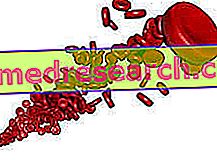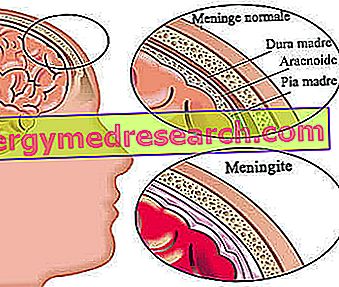Related articles: Food Allergy
Definition
Food allergies consist in the excessive reaction of the immune system against some molecules present in food. In practice, the body of an allergic person perceives an ingested substance as "enemy", thus producing special antibodies against it (IgE), thus triggering an allergic reaction.
The causes for which the immune system is activated in this way are not known exactly. However, we know that at the base of food allergies there is a basic genetic predisposition, which is added to other factors, such as weaning too early and artificial feeding.
Any food can potentially produce allergic reactions: all of them, in fact, contain proteins or other components with allergenic activity. Although there are many foods reported as a cause of adverse reactions, food allergies are mostly caused by milk, eggs, soy, shellfish, wheat, peanuts and nuts.
Additives can also cause symptoms similar to a food allergy; those that give major problems are benzoates (added to industrial drinks), monosodium glutamate (found in stock cubes) and sulphites (used in the preparation of wine). In these cases, however, it is more correct to speak of non-allergic food hypersensitivity (or pseudo-allergic reactions); in fact, although the symptoms are similar to those of an allergy, in most cases there is no involvement of the immune system.
Most common symptoms and signs *
- Lowering of the voice
- Increased transaminases
- Bubbles on the Tongue
- Burning to the tongue
- Burning in the mouth
- Bad digestion
- Abdominal cramps
- Stomach cramps
- Diarrhea
- Dyspnoea
- Edema
- Flatulence
- Glossitis
- Dry throat
- Eyelid swelling
- Abdominal gurgling
- Insomnia
- Swollen lips
- Freckles
- White Tongue in Children
- Inflated tongue
- Red tongue
- Functional Meteorism
- Urticaria
- Heaviness in the stomach
- wheals
- Throat itch
- Itching in the hands
- Red Dots on the Tongue
- rhinorrhoea
- Inflated stomach
- thrombocytosis
- He retched
Further indications
The most common symptoms of food-based allergic reactions concern the gastrointestinal system and occur within a short time after ingesting the food (from a few minutes to an hour). Dyspepsia, diarrhea, abdominal cramps, flatulence and vomiting may occur. There are also frequent discomforts in the oral cavity, such as the burning of the mucous membranes of the mouth, the prickly itch in the throat and the edema of the lips. Sometimes, hives also appear (itching, redness and wheals on the skin), rhinitis and asthma. In the most serious cases, there may even be an anaphylactic shock, with difficulty breathing, significant lowering of blood pressure and loss of consciousness.
The reactions of the immune system towards a food can be identified by searching for IgE found in the blood.
To reduce the risk of food allergy manifestation, it is necessary to avoid the consumption of the food to which you are allergic (exclusion diet).



